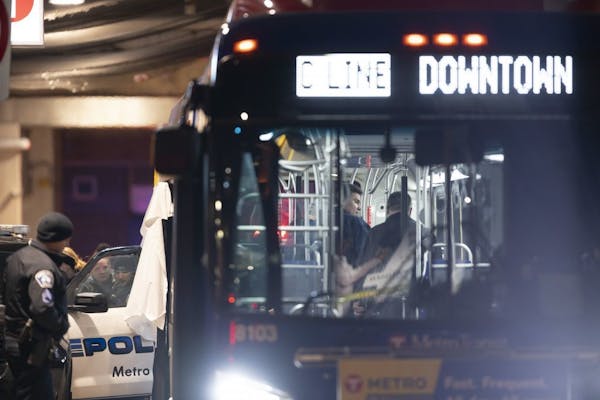Conrad Larson said he has never feared for his safety while riding Metro Transit buses, but he says a fatal shooting Thursday night on a C-Line bus in downtown Minneapolis is unsettling.
"I'm always concerned about things like that," Larson, 69, said Friday while standing at the very transit station in downtown Minneapolis where gunfire broke out the night before.
Investigators spent most of Friday trying to piece together what led to the deadly shooting that happened about 9:30 p.m. Thursday, and to build a case against the 26-year-old man who allegedly fired the shots that left a 51-year-old man dead and another man critically injured.
Malcolm James Lessley was charged Friday with second-degree murder in the shooting that occurred near Parking Ramp A in the 100 block of N. 9th Street.
According to charges, police responded to a call of a person shot in the face on the C-Line bus. One victim was pronounced dead at the scene, while the other was taken to HCMC, where he remains in critical condition. Their identities have not been released.
Witness descriptions allowed officers to flood downtown and quickly arrest Lessley, who was still armed with a 9-millimeter handgun, just minutes after the shooting and a few blocks away at 7th Street and Nicollet Mall.
Lessley remained in the Hennepin County jail where he was being held in lieu of $2 million bail. He has previous convictions for aggravated robbery and theft, according to court records.
It remained unclear if the suspect and the victims knew each other or whether an argument preceded the shooting, Minneapolis police spokesman John Elder said.
"Knowing the relationship between the three will be crucial in determining the motive behind this," Elder said, noting that police have "very good video" from cameras on the bus to rely on.
According to charges, surveillance video from the rear of the bus shows Lessley board and move toward the middle seating area. He and the victim appear to talk to each other before Lessley walks several seats closer, takes out the handgun and fatally shoots the victim in the face. Immediately afterward, he shoots the second victim in the head while he is standing next to a door.
Metro Transit on Friday brought in counselors to talk with drivers and transit employees who needed help processing the traumatic events, said spokesman Howie Padilla.
Metro Transit Police Chief Eddie Frizell said in an interview Friday that he first wanted to express his condolences to the victims' families and the passengers who witnessed the incident. Frizell said the Police Department is doing all it can to provide a safe transit system and that additional safety plans are expected to be released next week in partnership with the Metropolitan Council, which oversees Metro Transit.
This was believed to have been the first shooting aboard a Metro Transit bus in a decade, and the first on the new C-Line, a rapid bus that runs between Brooklyn Center and downtown Minneapolis.
Rape, robbery, aggravated assault and other serious crime on public transit — including buses and light-rail trains — increased by 35% in 2019 over the previous year, according to Metro Transit.
In November, a 75-year-old man was brutally beaten after asking a group of young men to lower their voices while on a Metro Transit bus. He died three days later.
Three juveniles were arrested and charged in connection with violent assaults in November and December on Twin Cities light-rail trains. In January, a man was fatally stabbed on the Blue Line in Bloomington.
Thursday's fatal shooting came a day after light-rail operators told state lawmakers they often fear for their safety while on the job and asked for more protection.
Despite the recent spike in crime and high-profile events, Elder said the transit system, which provides as many as 250,000 rides a day, remains safe.
"We only hear about the bad things," Elder said. "No one ever hears about the seven or eight times I ride it every week and there is never an issue. Same thing for the vast majority that go through."
Larson, a two-time cancer survivor who depends on transit to get around, said he will continue to ride the bus.
"If it's my time to go, it's my time to go," he said. "If God wants me gone, he will take me. I have a good protector."
Tim Harlow • 612-673-7768

Minnesota State Patrol celebrates diverse new class of troopers

Fired Mpls. teacher accuses management of 'cancerous rot'

Jill Biden rallies women, teachers for the Biden-Harris ticket in Bloomington speeches
Neighbors, city officials at odds over Rochester lake dam

